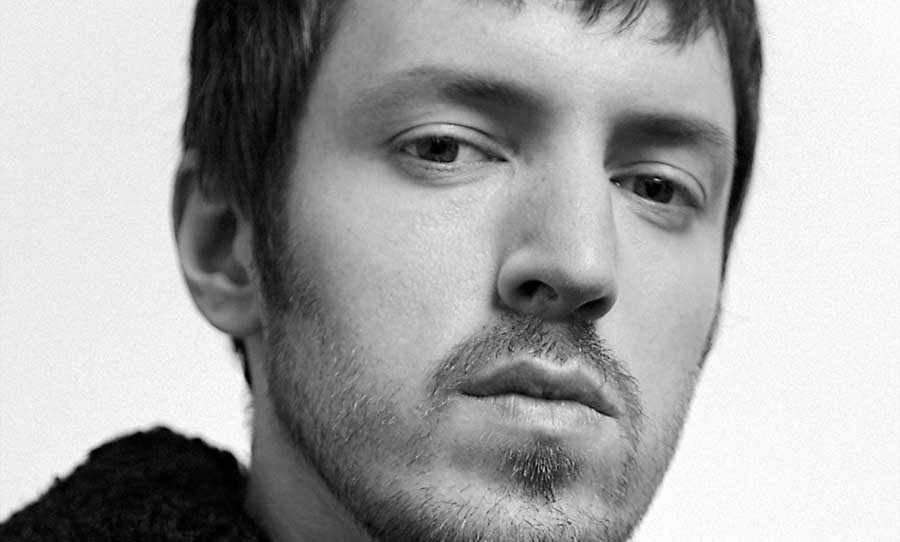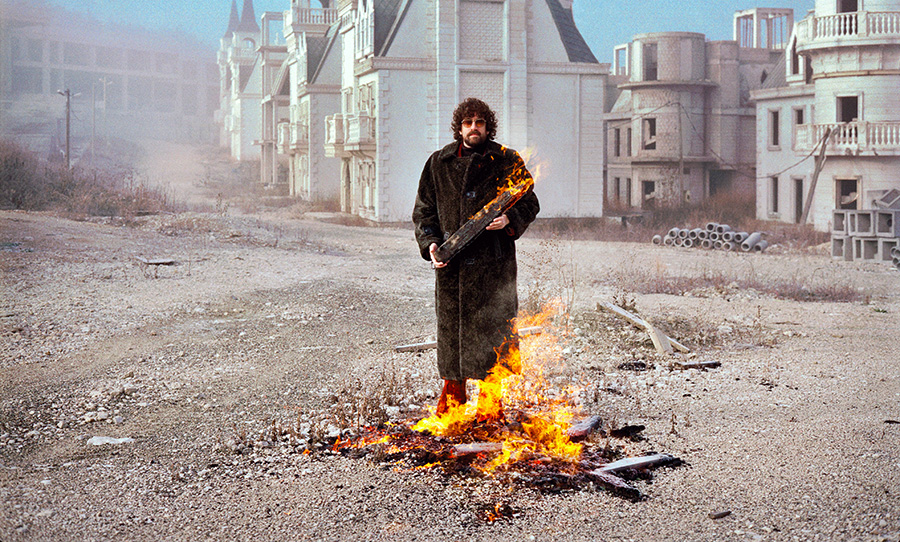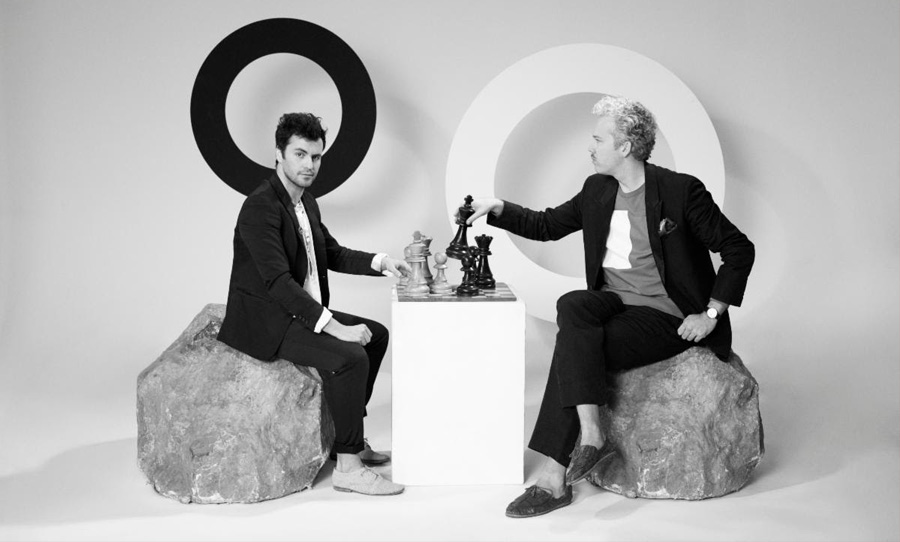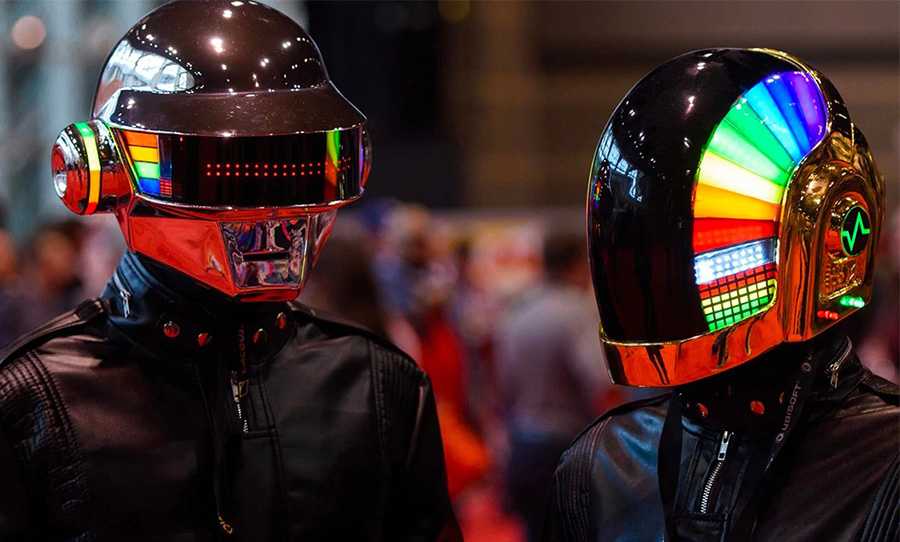SebastiAn is one of the most decorated figures in contemporary dance music. The Ed Banger signee has worked alongside Frank Ocean, Charlotte Gainsbourg, Justice, and countless others – and that’s not even mentioning his career in remixing.
His music is categorised by a no-holds-barred sense of force, but as he explains, this exterior hostility is something he’s always trying to balance with a softer touch. Before his new album Thirst drops this month, we spoke to SebastiAn about what the world can expect.

After over a decade making some of the world’s punchiest and most aggressive dance music, SebastiAn is still finding new ways to bring the energy.
HAPPY: You’ve pulled off a couple of my favourite remixes ever. Is there an energy you look for in a track before saying yes to a remix?
SEBASTIAN: Depends. Sometimes I accept because I really love the song, sometimes it’s because I hate it. The trigger is that; if I hate something for real, it’s really fun trying to make something with it. And when you really love a track, there’s kind of a pressure to do something else.
HAPPY: Does the same go with artists you’ve worked with? Love some, hate some?
SEBASTIAN: Practically, yes. Most of the time I really love the artist or the track, but it’s mostly about the track. Even if I love the artist. If the track is really great I want to make something else of it, and if the track is really shit, I really love to make something out of it too.
HAPPY: The only time I’ve seen you play live was in Portugal, in about 2011. It was really a sensory overload. Is that still how you feel about the live show, do you want it to be intense and overwhelming?
SEBASTIAN: That’s the point of it. I can sometimes be less aggressive in my production, but live to me is… it’s so enjoyable to make this intensity and aggressiveness in front of some people who are here for it. For them to kind of forget their week… I don’t know. Live for me, it’s like going to a gym to box or something. I’m never going to be able to make a sweet live [show], it’s not my interest.
HAPPY: It was crazy, I think I went straight from you to see Radiohead, it was almost silent in comparison. Were there any artists you grew up on who inspired you to perform that way?
SEBASTIAN: It’s not about artists in general, it’s more about… I like noise. It’s a direct feeling that I have when I’m on stage. I could say that I saw some people in the punk scene or the hardcore scene, but it’s not about those things. For example, in my – I don’t know if you could call it a career – but I had people in my label that were making both aggressive and sweeter music. It’s being able to punch people, but in a good way, that’s how I feel. But it’s not a reference from other artists, it’s a feeling. I need it to be quite aggressive, I don’t know why.
HAPPY: I understand, it’s the first time I’ve thought about it in relation to punk. But punk and techno, from an audience perspective, are both about that escapism where you really get overwhelmed.
SEBASTIAN: Exactly, exactly.
HAPPY: A lot of artists I like who produce really hardcore electronic music offset it by making more ambient, more minimal, or more ambient music. Like Aphex Twin and a few others. Has that ever appealed to you?
SEBASTIAN: When you do something, as you say ‘sweeter’, you might feel like it’s a good track or that it worked, but it’s not… I would never make a track just because it was sweet or something like that. Just because you feel like it’s working, or that’s your mood. On the new album as an example, I didn’t push down the intensity, but I did use more harmonies and that kind of thing. But the ‘strong’ thing… for example you can have some classic music which is not technically aggressive but the intensity is still punching. Sometimes I’m bored after 10 years of making the same hardcore thing, you try to find another way to be hard, but not by punching people, more like touching them.
It’s what I’m trying on the new album. The first track, Thirst, the one with the video I did with Gaspar Noé, it was a test for me to create an ambience which was quite aggressive but without any beats. When you listen to the track, there’s no beats inside, and the beat is usually what you use to punch. When you play live, the beat is what hurts. I didn’t use any beats on this track, but you can feel something scratching at you. It was an exercise, to have this hard thing but in another way. I’m trying different ways to be aggressive.
HAPPY: It sounds like you’re always trying to challenge yourself.
SEBASTIAN: Yeah, I’m always interested, I’m searching for things. That idea, or that thing, I’m always searching for things that are not new, but maybe different. I don’t like to repeat myself too much.
HAPPY: Right.
SEBASTIAN: Like the music I did on the first album, it’s almost normal now, you know? A lot of people are doing that. I’m trying to find other ways to keep the same heart of what I did before.
HAPPY: Did producing records for other artists open you up to that feeling?
SEBASTIAN: Yes, it changed me quite a lot. Working with other artists is really something that you learn, because it’s not your idea, it’s not your thing. You are here to feel what the artist you’re working for works, and you are here to almost hide yourself, to push what the artist wants in front. It helps you to find a different way to work because you don’t work for yourself. So working with Frank Ocean or Charlotte Gainsbourg, people who are very different in music, it definitely helped me, because I tried so many different styles. All the things I tried for them I kept, and at the same time I had to learn from it.
HAPPY: It sounds like the producer role is almost completely opposite to what you’re trying to do with your own music.
SEBASTIAN: It’s totally the opposite. You have to hide yourself. Well, not hiding for real, but you have to push down your instinct to reveal the artist you’re working for, more than being like ‘ok, I did the album, you can hear it’. It’s totally the opposite. Even if the artist doesn’t really know what he wants, you’re here to reveal the details, so it’s hiding your own obsession or your own style. It’s totally the opposite of working for yourself, but also a different challenge.
HAPPY: Was getting into that mindset difficult for you?
SEBASTIAN: No, working for others is actually way easier than working for me. Because I don’t have to think about my own existence.
HAPPY: What does the title of the new album, Thirst, mean for you?
SEBASTIAN: For Total, the first one, I love generic terms that could mean many things at the same time. Like Total could be totalism, it could be something strong, it could be whatever. Thirst, after eight years… it could thirst, it could be a thirst like somebody who wants power… I like when you don’t know exactly, but you have 10, 20 different meanings. I really like generic terms.
HAPPY: I think that’s important in dance music especially, letting the listener prescribe their own meaning to things.
SEBASTIAN: I don’t want to be like, ‘here it’s going to be this’, ‘here, you’re going to love’ or ‘here, you’re gonna dance.’ People have to have an interpretation by themselves.
HAPPY: As a last thing, I want to ask a question about France. For me, French dance music has one of the most distinct identities of any music scene in the world. What do you think it is about France in particular that inspires such a strong national character?
SEBASTIAN: I think what we call the ‘French touch’ is coming from way back, now it’s French people in production. We also have this old story with disco, and it’s kind of a junction between this old story with disco music, or even before we had a jazz thing. But I think what the French touch is, it’s a vision of what all the French people in music… it’s our interpretation or our projection of all the American music. The funk, the disco, the hip hop… we dreamt so much about it in the ‘80s and ‘90s that it started to become something else. I don’t actually know where it’s come from, like if it’s Paris or France in general, but most of the artists are coming from Paris. I think, maybe at the end of the ‘90s with Daft Punk it was, like I told you, it was the dream they had about American music… I don’t know. We discovered by ourselves we were different, but I don’t think it was intentional.
HAPPY: Are there any other mediums of French art that you’re inspired by? Anything, from fashion, to film, to architecture.
SEBASTIAN: I grew up in Serbia, so I’m French but my family is from Serbia. The only thing I’ve found, not long ago, it’s closer to the architecture of Belgrade in Serbia. Because you have this old city, it’s almost Vienna, very classical and romantic, then at the same time you had Communism right after and you have these huge blocks. I just feel like, the last time I came back from Belgrade, that it was what I am in my music, it was a balance between something very romantic and something very tough. But I just discovered it when I came back last year, that there’s this kind of balance between the essence of the architecture in Belgrade and my music.
HAPPY: That’s a great answer. Thanks very much.
SEBASTIAN: Thank you.
Thirst is out November 8th via Ed Banger Records / Caroline Australia.



